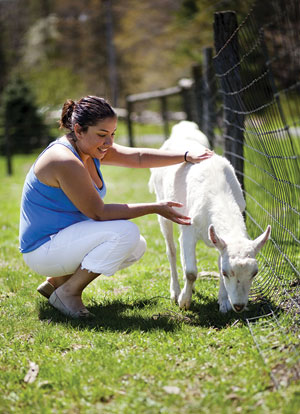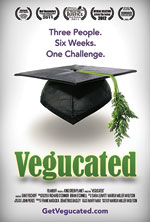BY JEFF HECHT
 According to a recent study by the Vegetarian Research Group of Harris Interactive, over 7 million Americans consider themselves vegetarians, and over 1 million observe a vegan diet. If you’re considering becoming a vegetarian or vegan, now is a great time—there have never been more resources or options to help you adopt this lifestyle!
According to a recent study by the Vegetarian Research Group of Harris Interactive, over 7 million Americans consider themselves vegetarians, and over 1 million observe a vegan diet. If you’re considering becoming a vegetarian or vegan, now is a great time—there have never been more resources or options to help you adopt this lifestyle!
Improved health and nutrition, as well as economic, environmental, and social concerns, are all common factors in the decision to change dietary habits, but adopting a vegetarian or vegan diet often ties back to one overarching theme—personal responsibility.
According to Maya Nahra, RD, LD, a recognized Valley dietician and nutritionist, the decision to become a vegetarian is often based in one’s personal responsibility to one’s self, family, or the environment as a whole.
“Becoming a vegetarian starts with a mindset,” says Nahra. “Wanting to feel better, wanting to be more active, or wanting to live longer all create an ‘aha’ moment in which dietary lifestyle change becomes not only possible, but embraced.”
The health benefits of a vegetarian lifestyle are well documented. Vegetarians are at lower risk for cancers, diabetes, kidney disease, and other medical or health complications because their diets are rich in vitamins, antioxidants, minerals, carbohydrates, and fiber. Additionally, an overabundance of meat in our diets can clog arteries, provide too much protein, and stress our circulatory systems with cholesterol and saturated fats.
“Our bodies become accustomed and acclimated to what we put in them,” notes Nahra. “Even though we regularly put food in our bodies that we know can cause problems down the road, our perception, based on how we feel and our energy level, is that we’re doing right by our bodies, when we can clearly be doing better.”
The decision to become vegetarian or vegan is often event-triggered, such as a visit to a doctor or other change in our health status that causes us to look for lifestyle alternatives.
“People around the age of 35-45 years old often undergo changes, where they realize they cannot sustain and energize themselves as they did up to that point,” explains Nahra. “In addition to lifestyle changes regarding dietary habits, there is often an accompanying ‘redefinition of self’ which includes exercise, better sleep habits, and other changes to adjust a person to a ‘new normal’ state of wellness.”
Personal responsibility, however, is not just recognizing changes in our bodies and taking action, but understanding how we live and coexist on our planet, and how we as individuals can effect change on a local level to improve quality of life globally. Making an individual choice to become vegetarian or vegan aligns with our sustainability initiatives as a society.
Under current practices, our planet’s fragile ecosystems and its ability to provide enough food for an ever-increasing population is unsustainable, but with more people adopting vegetarian diets, this trend is changing.
According to a study by the American Journal of Clinical Nutrition (AJCN), the field of Nutritional Ecology as a scientific discipline is a holistic concept that considers all links in the nutrition system, with the aim of sustainability. Nutritional Ecology deals with the local and global consequences of food production, processing, trade, and consumption, and according to AJCN’s research, vegetarian diets are well suited to protect the environment, reduce pollution, and minimize global climate changes.
Maya Nahra agrees. “On a global level, the creation of foods for vegetarian diets uses less water, saves trees and animals, and reduces pesticides in our food supply and pollutants in our atmosphere,” notes Nahra. “Becoming a vegetarian or vegan is a very altruistic way for people show personal responsibility to the environment and make efforts towards long-term sustainability while accepting responsibility for their own health.”
Get Vegucated

If you are considering going vegetarian or looking for that special reason to transition, consider getting “Vegucated” – a feature-length documentary that follows three meat- and cheese-loving New Yorkers who agree to adopt a vegan diet for six weeks.
There’s Brian, the bacon-loving bachelor who eats out all the time; Ellen, the single mom who prefers comedy to cooking; and Tesla, the college student who avoids vegetables and bans beans. They have no idea that so much more than steak is at stake and that the fate of the world may fall on their plates. Lured with true tales of weight lost and health regained, they begin to uncover hidden sides of animal agriculture and soon start to wonder whether solutions offered in films like “Food, Inc.”, go far enough. Before long, they find themselves risking everything to expose an industry they supported just weeks before.
But can their conviction carry them when times get tough? What about on family vacations fraught with skeptical step-dads, carnivorous cousins, and breakfast buffets?
Part sociological experiment, part science class, and part adventure story, “Vegucated” showcases the rapid and at times comedic evolution of three people who share one journey and ultimately discover their own paths in creating a kinder, cleaner, greener world, one bite at a time.
SOURCES
Interview with Maya Nahra, RD, LD – myintentfullife.com
statisticbrain.com/vegetarian-statistics
Vegetarian-Nutrition.info
Jeff Hecht is a public relations consultant and freelance writer. jeffhechtpr.com
and @JeffHechtAZ







